The Best Portable Grills of 2021
Posted by admin on
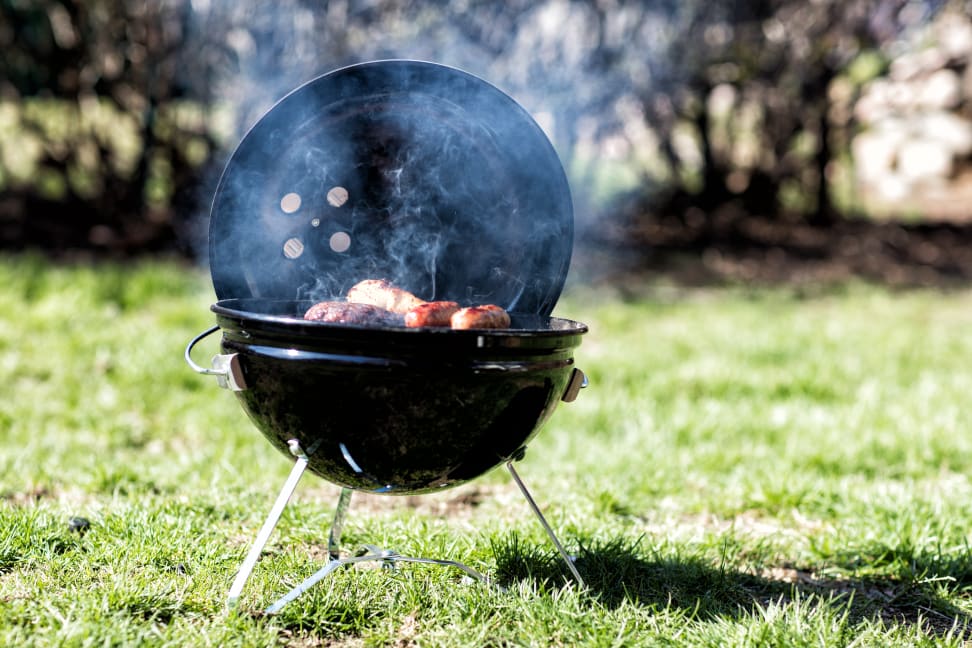 — Recommendations are independently chosen by Reviewed’s editors. Purchases you make through our links may earn us a commission.
— Recommendations are independently chosen by Reviewed’s editors. Purchases you make through our links may earn us a commission.Unlike a full-sized grill, portable grills take up very little space and are easy to move around. They’re also a great option for anyone who only wants to grill occasionally, while camping or in the middle of a tailgate party. While their compact size makes them less than ideal for cooking large cuts of meat—like a pork shoulder over indirect heat—portable grills are perfect for cooking up burgers, brats, and chicken over high or low temperatures.
We selected six gas grills, nine charcoal models, and three pellet grills and subjected each one to a grueling series of tests before coming to the conclusion that the Weber Q-1200 (available at Amazon for $219.00) is the best portable grill you can buy. It’s compact, powerful for its size, easy to use and clean, and can be fuelled by a lightweight fuel canister.
That said, if you think that lugging around a heavy bag of briquettes and the mess that comes with cooking over charcoal is a small price to pay for smoky, delicious flavor, the Weber Jumbo Joe (Available at Amazon) is our best portable charcoal grill. It cooks just as well as its full-sized counterpart.
Finally, for those that enjoy the ease of use, precise control, and smokey flavor that cooking or smoking with a pellet grill can provide, we recommend the Traeger Ranger Pellet Grill ( Available at Amazon).
These are the best portable grills we tested ranked, in order:
Gas Grills:
- Weber Q 1200
- Weber Traveler Portable Gas Grill
- Cuisinart Petit Gourmet
- Coleman RoadTrip 285
- Char-Broil Grill2Go X200
- NOMADIQ Portable Propane Gas Grill
Charcoal Grills:
- Weber Jumbo Joe
- Lodge L410 Hibachi Style Charcoal Grill
- PK Grills PKTX
- Big Green Egg MiniMax
- Weber Smokey Joe
- Fire Sense HotSpot Notebook
- Char-Broil American Gourmet
Pellet Grills:
- Traeger Ranger Pellet Grill
- ASMOKE AS3000 Portable Grill
- Green Mountain Grills Davy Crockett Pellet Grill Tailgating Package
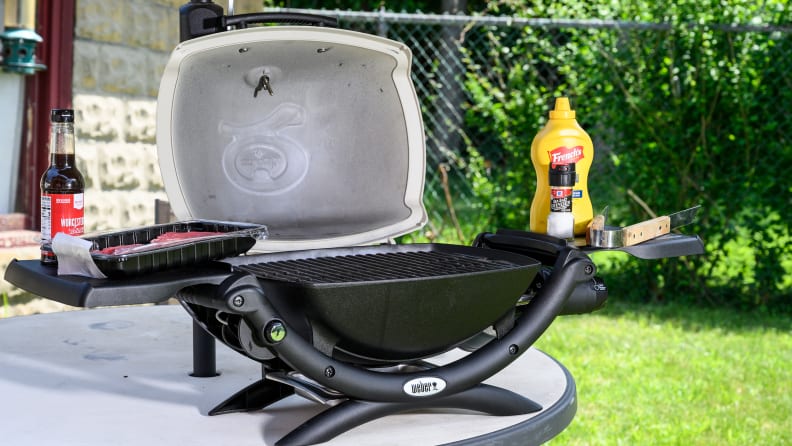

The Weber Q 1200 is a well-made, versatile portable gas grill.
Weber makes great full-sized grills—the Spirit II E-310 was our top pick for gas grills. However, we weren’t sure they could pack that power into a portable package until we started testing. The Weber Q 1200 immediately pulled away from the pack with its cast-iron grilling grates, giving us beautiful, well-defined grill marks on the burgers we cooked on it. Although it only has one burner, it was able to deliver a surprising amount of heat and consistently at that: heat distribution across the Q 1200’s 189-square-inch cooking cast-iron grilling grates proved even enough to allow for great grilling, cooking food evenly over its entire grilling surface. This is a grill that offers enough space to cook for a small crowd (we easily fit six burgers on its surface,) and packs up compact enough to disappear once your meal is done.
When it comes to features, the Q 1200 was one of the few portable grills we tested that had side tables that were sturdy enough to hold a plate full of food. The grill’s plastic side tables fold in to keep the grill compact for portability, although you will want to let the grill cool down before stowing them away to keep them from melting. It’s a good idea to stow the tables when the grill isn’t in use; these grills are light enough that the wind can catch the tables and blow the whole thing over! That lightweight came in handy when it came to carrying the grill, and its handles were cool enough to hold even after cooking over high heat.
If accessories are your thing, Weber’s got ‘em. You can purchase a portable cart to raise the grill to standing level, which comes complete with wheels to roll it around. They also make a flat iron griddle which you can swap-in for the grill grates, a cover to keep the Q 1200 clean between uses and an adapter that’ll let you use it with larger, refillable tanks. Considering all of this, it was a no-brainer to name this our Best Portable Gas Grill.
Pros
-
Consistent heat distribution for even cooking
-
Side tables are sturdy enough to hold a full plate
-
Fits a lot of food for its compact size
Cons
-
Lightweight enough to blow over in high wind
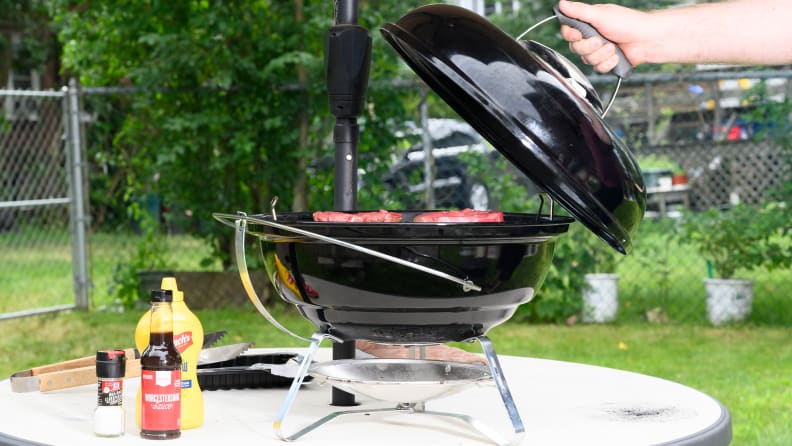

Weber's Jumbo Joe Charcoal Grill is almost as functional as their full-sized models.
It was the small features that made the Weber Jumbo Joe stand out from the competition. Most of the charcoal grills we tested had no problem cooking delicious, smoke-infused burgers and chicken drumsticks, but the quantity of food they could handle was minimal. The Jumbo Joe, with its 240-square-inch cooking surface, allowed us to cook in quantities that rival a full-sized grill. It could easily fit ten burgers, a few racks of ribs, or a whole chicken, and it offered enough room to arrange the coals into an indirect heat pattern. This allows for heat control which, as every great outdoor cook knows, makes for fabulous outdoor cooking. The locking lid really put it over the top, giving us an easy handle to transport the grill. We felt safe enough moving the grill while it was still hot, but you’ll want to close down the bottom vents to prevent coals from spilling out, just in case.
As with its larger Weber kettle grills siblings, the Jumbo Joe’s stainless steel grates were easy to clean, as was the large ash catcher bucket clipped in underneath the grill. The grill’s vents were well located and easy to open and close. Being able to control the airflow is important when cooking over charcoal; the bottom vents control the heat of the fire, while the top exhausts hot air and smoke out of the grill. And while it’s size may have made it bulky and hard to transport, Weber’s round, kettle design kept it from being intimidating.
For the price, you really can’t go wrong with this portable charcoal grill. It’s large enough to use as your primary grill if you have a small outdoor space and portable enough to bring with you to tailgating events or camping. Because of that, we have no hesitation in naming it our Best Portable Charcoal Grill.
Pros
-
Cooking surface rivals a full-sized grill
-
Locking lid makes for easier transport
-
Enough room to arrange coals for indirect heat
Cons
-
Size can be bulky for transport
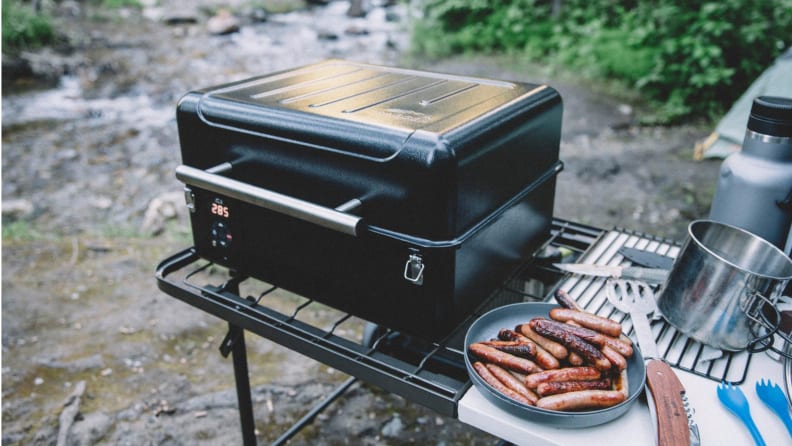

The Traeger Ranger is the best portable pellet grill around.
If you’re looking for an electric-powered portable grill that infuses smoky flavor into your food, the Traeger Ranger Pellet Grill is the way to go. It’s a miniature version of our favorite pellet grill, and it’s capable of cooking at temperatures ranging from 165°F to 450°F. We tested it at both high and medium temperature ranges, and it maintained consistent temperatures without wavering more than 10°F from the setting. Pricewise, the Ranger is one of the more expensive portable grills we’ve tested, but it excelled when it came to performance.
The Ranger’s 176 square inches of cooking space fits about six burgers, which isn’t enough to feed a crowd but is more than enough space to feed two to four people. We actually liked the reduced cooking area compared to other portable pellet grills we tested because it makes the unit more compact. After locking down the lid, this 13- by 21-inch tabletop grill fits easily into the storage compartment of your RV or on the floor in the passenger side of a car. That said, it does weigh 60 pounds and doesn’t have any carry handles, so it is a little difficult to transport.
When it came to performance, Traeger’s reputation preceded itself. The burgers cooked evenly throughout the cooking surface while the chicken drumsticks prepared on the Ranger were the best out of all the grills we tested. The Ranger has a heat deflector plate that prevents direct searing, but everything we cooked on this pellet grill was infused with smoky flavor from the pellets. The eight-pound pellet capacity is plenty for a regular grilling session, and we had more than half the pellets left in the hopper after hours of testing. While we didn’t test it on low-and-slow smoking temperatures, we anticipate this hopper capacity should be able to produce smoke for five to six hours before needing a refill. We also loved that the Traeger is easy to clean, especially if you use Traeger’s drip tray and bucket liners.
Our only major complaint is the control panel. It only has four buttons but is capable of several functions, from a Stay Warm setting to adding a timer or a target temperature for the included meat probe. The Ranger’s user manual clearly defines how to use the four buttons to access each function. You may want to keep it handy for the first few grilling sessions until you get the hang of it.
Pros
-
Maintains consistent temperatures
-
Cooks evenly
-
Easy to clean
Cons
-
Heavy
-
No carry handles
-
Confusing control panel
How We Tested Portable Grills
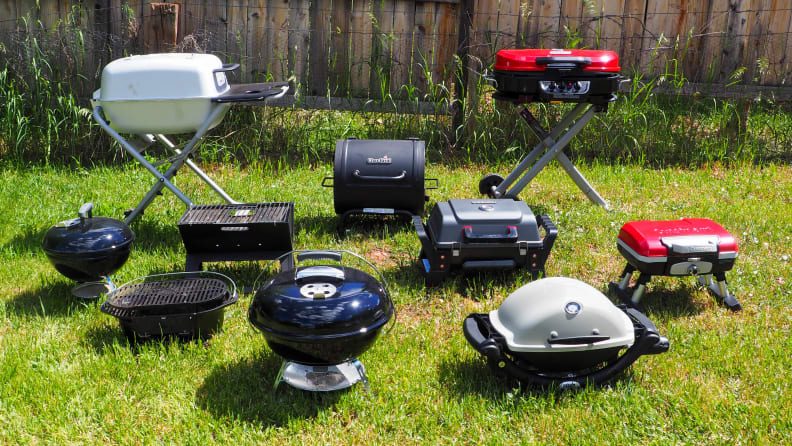
This crop of portable grills kept us cooking for days.
The Tester
Hi, I’m Lindsay Mattison, a trained professional chef and outdoor enthusiast. During the summertime, you’ll find me outside grilling burgers on the patio, cooking a pork shoulder on the smoker, or building a yakitori grill on my fire pit. If I can cook it outside, I will!
One thing I’ve learned over the years is the importance of having a reliable grill; it’s absolutely key to building confidence in your grilling game. I’d love to help you find the right one for you!
The Tests
Using my training and years of grilling experience as a starting point, I spent hours researching the latest, greatest, and most popular portable grills available online and in stores. Using price, quality, and brand reputation to narrow the field, I chose several highly-rated portable grills available from popular shopping outlets like Amazon, Home Depot, and Lowes to call in for testing. After receiving the test candidates, I set about building each one.
After assembling each of the grills, my goal was to assess the size of each grill’s cooking surface, as well as its weight and shape, fuel type (gas, charcoal, or pellets), ease of transport, and overall performance. Since most people use their grills to sear foods like burgers and steaks, I started off by testing each grill at the highest possible temperature, turning the propane burners to high, distributing hot coals across the entire grilling area for charcoal grills, or cranking the pellet grill’s dial to its hottest setting.
If the grill had a lid, I covered it to let the temperature build. Almost every grill reached temperatures of over 500°F, and some of the charcoal grills got as hot as 700°F! Then, I grilled burgers on the uncovered grill, spaced 2-inches apart, cooking them for 5 minutes a side. When the timer expired, I measure the internal temperature of each burger using a probe thermometer in hopes that they were all within 5 to 10 degrees of each other. I then assessed the char pattern and grill marks of each burger to see how the grill grate’s material contributed to the test. Stainless steel grates tend to be easier to clean, but they don’t transfer heat as well as cast-iron grates, which create more pronounced grill marks. For the gas grills, we also placed slices of white bread over the entire surface to map out the heating pattern. Grills with even heating really shined here, creating predictable patterns without noticeable hot or cold spots.
What You Should Know About Portable Grills
Should I Buy A Gas, Pellet, Or Charcoal Grill?
In the eternal debate over whether a gas, charcoal, or pellet grill is better for outdoor cooking, there is no wrong answer.
If you’re cooking your food on the grill instead of inside the house, it will capture that beautiful charred essence and smoky flavor from cooking over open flames. You likely already have strong opinions on the topic of gas versus charcoal, or you may already be a pellet grill proponent, and we’re not here to change your mind. If you’re still on the fence on the subject, however, here are the pros and cons of using each type of grill to help you choose the right one for you. Let’s talk about gas grills, first.
Gas grills are more convenient than charcoal grills, especially when it comes to portability. It’s much easier to lug around a one-pound propane canister instead of a huge bag of charcoal or pellets! They’re also significantly easier to clean (no ash!), and they heat up more quickly. Gas grills come equipped with electric starters or a spark wheel to ignite their gas burners, helping you get cooking faster than charcoal users can manage. It’s also easier to control the heat while you’re grilling with gas than it is when using charcoal; to adjust the heat up and down, simply twist a knob instead of fiddling around with hot coals. It is a bummer when you run out of propane, though, so you always want to double-check before heading into the woods.
Charcoal grills, on the other hand, are significantly less expensive than their gas counterparts. Many people prefer the flavor of cooking over a charcoal grill, as the briquettes they use for fuel infuse smoky elements into the food. The coals created by burning those briquettes can burn hotter than propane, which can be a pro or a con: you’ll get a serious sear on your food if that’s what you’re going for, but it’s also easy to burn your food over 700° F temperatures.
Finally, there are pellet grills. Pellet grills tend to cost more than gas or charcoal grills because they use onboard computers with expensive components to fuel the fire. Instead of being heated by gas, propane, or electricity alone, a pellet grill employs an electric-powered auger to move wood pellets to a firebox, where they’re ignited creating the fire that heats the grill. This creates set-it-and-forget-it functionality—you don’t need to fiddle with dials or vents to reach the desired temperature. It also means you’ll need access to an electrical outlet, so keep that in mind before picking up a portable pellet grill. Pellet grills are usually used at low temperatures to smoke meat, but they can also be used at higher temperatures. Most manufacturers cap out between 400°F and 500°F, which is comparable to cooking over gas but the grill won’t get quite as hot as cooking over charcoal. They also often have heat deflector plates that prevent direct searing and grill marks.
Is An Electric Grill Better Than Gas Or Charcoal?
While these appliances are called “grills,” they heat your food using a coil instead of flames. That makes them closer to an electric griddle than a grill. If you want to grill indoors, we’d suggest you use your oven’s broiler, a cast-iron griddle pan, or an indoor grill. In order to use an electric grill, you need an accessible power outlet (a feature that not all decks or patios have), or a high-powered extension cord (a hassle to use and a trip hazard.)
How Do Grills Work?
Gas grills have a BTU—British Thermal Units—rating to measure the amount of heat each grill can produce. More and more, grill manufacturers are pumping out grills with higher and higher BTU counts, and consumers rely on these numbers as a measure of the grill’s performance. So, what’s the deal: do the BTUs actually matter?
I’m going to go ahead and say no: our top two gas grill picks had fewer BTUs per square inch of cooking space than the competition, produced evenly-cooked food, and offered a more enjoyable cooking experience. BTUs don’t necessarily give you a good measure of how the grill’s design will affect the cooked food. It’s also important to keep in mind that higher BTU grills burn through propane faster, and if the lid doesn’t fit tightly onto the grill, all that heat won’t remain inside anyway.
At the end of the day, BTUs are simply an indication of how much heat your grill can produce, not how hot it will actually get inside your grill. So, look at the number if you like, but don’t put too much stock into it.
When it comes to charcoal, you get full control of how much heat your charcoal grill produces. It takes a little practice to get the hang of it, but it’s all about controlling the airflow, the coal patterns, and the food’s proximity to the hot coals. You’ll learn to allow oxygen in by opening up the bottom vents, fueling the coals, and creating intense heat. Close ‘em up to choke off the oxygen and lower the temps. Portable grills with a lid also have top vents to give you some control of the heat, but they also change the flavor of the food by venting the hot exhaust or keeping the smoke inside the dome. You can also control the heat by managing your coal bed and rearranging their placement inside the grill. If your portable grill is large enough to make a two-zone fire, you can move the food off of the flames to a cooler area where they’ll cook over indirect heat.
The other thing you’ll notice about charcoal grills is that most of them have flimsy wire grates as opposed to gas grill’s heavy cast-iron grates. Before you bemoan the loss of grill marks, know that they’re entirely overrated. Sure, they look great, but wire grates give your food better overall browning, crusting your burgers and steaks with extra caramelized flavor. Plus, the wire grates are lightweight and easy to move around when you want to rearrange the coals underneath.
Pellet grills consume wood pellets similar to the ones used to fuel indoor pellet stoves. Pellet fuel is made by compressing sawdust into small spheres The ones used in pellet grills are usually made with 100% hardwood or contain food-grade oils to add flavor.
To use the grill, the pellets are loaded into a hopper, located on the side of the grill. An electric-powered auger transfers the pellets to the fire pot inside the grill. The ignited wood pellets produce flames until the grill reaches the set temperature. Once the desired temperature is reached, the auger’s rotation slows, dropping fewer pellets into the pot to maintain the heat. The grill’s heat deflector plate acts as a physical barrier to keep the food from being exposed to the flames. The barrier also keeps cooking grease from creating flare-ups. The grill’s internal fans disperse the heat and smoke created by the burning pellet fuel around the grill, surrounding your food and heating the inside of the grill similar to a convection oven.
At low temperatures, the pellets will smoke without creating a large fire. This infuses smoky flavors into the food, similar to what you’ll find when grilling over wood or charcoal. When set to higher temperatures, less smoke is produced, and the fire pot focuses on creating heat. Since the heat deflector plate prevents direct searing and grill marks, the food crisps up like it would when roasted inside a high-temperature oven.
How Do I Start a Charcoal Grill?
There are several ways to start a charcoal fire, but using lighter fluid should be last on the list. I don’t know about you, but I can totally taste the lighter fluid in the finished product. No, thank you! You can stack your coals in a pyramid and use a starter cube to ignite the pile or use a chimney starter, like the Weber 7429. Simply place some wadded-up newspaper underneath the chimney, add your coals, and light the newspaper on fire. They’ll be ready to dump into the grill base about 15 to 20 minutes later when the coals in the middle glow bright red and the ones on top become white and ashy. Using a chimney is also a good way to know how many briquettes you need: a full chimney will produce temperatures in excess of 550°F. For cooler grilling temps, fire a half chimney (about 400°F) or a quarter chimney (about 300°F).
Other Portable Gas Grills We Tested
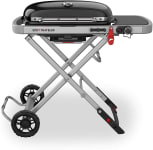
If our top gas pick is out of stock, or you’re looking for a portable grill that’s well suited for cooking for a crowd, we recommend the Weber Traveler Portable Gas Grill. The Traveler performed well in all our tests, boasting even heat throughout its 320 square inches of cooking space. That’s almost double the cooking space offered by the Weber Q 1200, which only has 189 square inches. With the Traveler’s large cooking surface, you could easily grill 14 to 15 burgers, at the same time. Like the Q 1200, the Traveler has a single gas burner and cooks over cast-iron grates. This means it can’t be used with indirect heat, but the lowest heat setting was low enough to cook our chicken drumsticks to golden-brown perfection.
The Traveler comes built into a rolling cart that stands at the perfect height for most grillers. It has one large, sturdy side table that had no problem holding a plate full of food. When the grill is cool, you can fold the cart down small enough to fit into the trunk of a car.
All in all, the Traveler is a solid choice for anyone who cooks for five to six people, or for someone who wants to routinely use their portable grill on a deck or patio. When unfolded, the grill measures 43.6 inches tall, 23 inches deep, and 37.2 inches tall. Depending on the size of your balcony, it may be a good option there, too.
Pros
-
Large cooking surface
-
Comes with a built-in stand
-
Folds down for easy transport
Cons
-
Heavy
-
Can’t be used with indirect heat
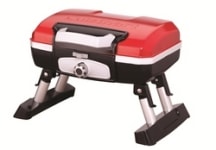

The Cuisinart Petit Gourmet did a fantastic job, overall. We loved its lightweight, small profile and how easy it was to transport: the lid locks and you can carry it by the handle. When you’re ready to cook, the legs pop out and create a sturdy base. The lid is smartly designed to keep smoke from flying into our face when it was open, and you can comfortably fit six burgers on its porcelain-enameled grate.
We were happy with the Petit Gourmet's even heating, but it wasn’t quite as powerful as some of the other gas grills in this guide. The chicken took longer to cook, although it looked beautiful and tasted great when it did get there.
Pros
-
Sturdy design that's easy to transport
-
Even heating
-
Lid design keeps smoke out of griller's face
Cons
-
Takes longer to cook chicken than similar models
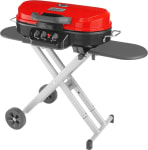
We were super happy with the Coleman RoadTrip 285’s design. The portable cart was easy to lower for transport, letting us wheel the 3-burner grill to and from events. We love the pull-out side tables, and the grill was decently sturdy when it was set up, too. Add in the eight-burger capacity and we felt like we were cooking on a full-sized grill! We had some trouble with the griddle-like design in the middle of the cast-iron grates; the flat portion transferred more heat than the spaced grates, creating an uneven heating pattern. We also found this grill difficult to clean. The removable water pan is designed to catch grease, but it was a complete mess after our tests.
Pros
-
Portable cart is easy to lower for transport
-
Sturdy design that features pull-out side tables
-
Eight-burger capacity rivals full-sized grills
Cons
-
Griddle-like design makes for uneven heating
-
Difficult to clean
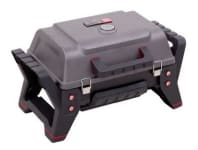
The portable design of the Char-Broil Grill2Go X200 was spot-on. The lid locks shut, and it’s light enough to carry it by the handle from place to place. Other than that, your money would be better spent on a better portable gas grill. We didn’t love the infrared grates, which got way too hot (even on the lowest setting) to cook the chicken through without burning it on the outside. The grates were also exceptionally difficult to clean, even with the included scraping tool.
Pros
-
Lightweight
-
Lid locks shut for easy transport
Cons
-
Infrared grates get too hot, even on low
-
Grates are difficult to clean
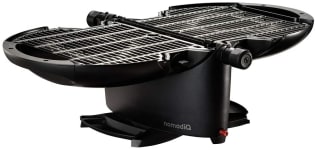
We loved the design of the NOMADIQ Portable Propane Gas Grill. The grill packs up into an extremely compact package that can be carried with one hand by a handle built into the top of the grill. Unlocking the grill and twisting it apart yielded a surprising amount of grilling space—enough to cook eight burgers on its 226 square inches of split cooking space. The split Y propane hose creates two temperature-controlled cooking zones, which is unique considering that most portable gas grills only have one temperature control knob.
On the flip side, this grill doesn’t have a lid and the two cooking zones are separated by the grill’s body. This means there’s still no way to cook with indirect heat on this gas grill, and the split cooking space means it would make cooking larger cuts (like ribs or a spatchcocked chicken) difficult or impossible. Additionally, we didn’t like how the propane hose is only designed to cook with one-pound propane canisters: there’s no way to use a propane adapter to hook it up to a larger propane tank of the sort that’s used with a full-sized gas grill. Given that being able to connect a tank adapter is a common feature among other portable gas grills, it’s a shortcoming that’s difficult to overlook.
Pros
-
Easy to transport
-
Large cooking surface area
-
Two temperature-controlled cooking zones
Cons
-
Doesn’t have a lid
-
Can’t be used with indirect heat
-
Not compatible with propane hose adapters
Other Portable Charcoal Grills We Tested
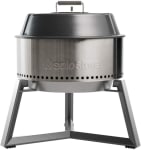
Solo Stove has been making fire pits for years, and they recently started selling cast-iron accessories to turn those fire pits into grills. If you’re not looking for a combo fire pit/grill, we recommend picking up the Solo Stove Grill Ultimate Bundle.
With its 22-inch diameter and 360-square inches of cooking surface, the Grill Ultimate Bundle is as large as a full-sized charcoal grill. Although it’s more expensive than most charcoal grills, we were extremely happy with the Solo Stove Grill’s performance on both direct and indirect heat cooking. Instead of using a traditional vent set-up, the Solo Stove uses their fire pit’s signature 360° Airflow technology to create convection airflow inside the grill. That surrounds the food on the grill with hot air, cooking it more quickly. As an added bonus, the Grill Ultimate Bundle comes with everything you need to get started as a backyard cook, including the grill, its stand, a shelter to protect the grill from the elements, and a carrying case. The package also comes with grill tools (a spatula, tongs, and a meat fork), four pounds of all-natural charcoal briquettes, and four fire starters.
Unfortunately, while you can arrange the coals inside of it for indirect heat cooking, the Solo Stove’s lack of vents means that you can only use the grill at one temperature. You’ll need to look elsewhere if you want to cook using low-and-slow smoking temperatures.
Pros
-
Bigger than most portable charcoal grills
-
Cooks effectively with direct and indirect heat
-
Bundle includes everything you need
Cons
-
No handles on grill
-
No adjustable vents
-
The stand is relatively short
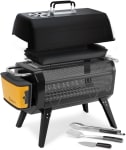
There’s a lot to love about the BioLite FirePit Cooking Kit. This portable grill can be used with either wood or charcoal and, as its name suggests, if you remove its grill grates, it can be used as a firepit. However, the feature that really blew us away with the BioLite is its built-in battery-powered fan. The fan not only kept smoke from billowing up in our faces while we were burning with wood, but it also stoked the coals. This made it possible to light the Biolite grill in half the time of a traditional charcoal grill. The fan has several settings, so you can turn it on low to preserve the coal bed when cooking chicken over indirect heat or crank it up to high to get a hard sear on burgers and steaks. That high heat was useful for searing vegetables when using the grill with its included cast-iron griddle, too.
The Biolite’s grill surface is only about 130 square inches, so it isn’t as large as some of the other portable grills we tested for this guide. However, we were able to fit and cook four burgers over direct heat or four chicken drumsticks when the coals were arranged to indirect heat. The Biolite’s small size (27 inches wide, 13 inches deep, and 15.8 inches tall) made it easy to transport, and the handles on each side of the grill were perfectly spaced for carrying it from one place to another.
Our only complaints about this grill have to do with its grates: they were hard to clean and didn’t fit snugly on top of the fire pit. While we were cleaning them with a grill brush, they moved around and almost fell off the grill. When the grill is hot, you’ll want to be careful with the grates as they could be a safety hazard.
Pros
-
Can be used as a fire pit or portable grill
-
Includes a battery-powered fan
-
Easy to transport
Cons
-
Small grilling surface
-
Grates are difficult to clean
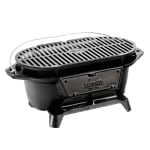
If you want to buy a portable grill that will last a lifetime, it’s the Lodge L410 Hibachi Style Charcoal Grill. This cast-iron charcoal grill is heavy, but it holds its heat exceptionally well, using fewer coals than most grills. It did a fantastic job of infusing smoky flavor into our burgers and bone-in chicken, and adding coals was as easy as tossing them in through the fire door built into the grill’s body. It was just as easy to control the heat with the sliding draft door located underneath the unit. Because it’s made from cast iron, this grill was super simple to clean, too; just wash it with warm, soapy water, dry it to prevent it from rusting, and apply a thin coat of oil to keep the grates seasoned.
It was missing a few features to earn our top pick, though. It was smaller than most of the grills, maxing out at four burgers. Plus, it’s heavy (about 30 pounds), and it doesn’t have a lid, making it impossible to turn it into a mini smoker without jerry-rigging it with aluminum foil.
Pros
-
Holds even heat exceptionally well
-
Simple to clean
-
Does well infusing smoky flavor
Cons
-
Maxes out at four burgers at a time
-
Too heavy (30 lbs.) to transport easily
-
Doesn't come with a lid
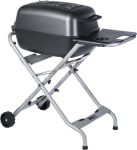
The PK Grills PKTX is a great option for anyone looking for a fully-functional charcoal grill with a smaller outdoor area. The 300-square-inches of rectangular cooking area can fit about ten burger patties at a time, and the grill folds down to make it easy to store and wheel to tailgating events. The grill’s four vents promoted air flow suitable for direct or indirect heat cooking methods, and the grill grate hinged in half to allow plenty of access to the coals underneath.
On the flip side, we didn’t love the lid, which was heavy and felt like it was going to fall off if we didn’t open it carefully enough. The bottom vents were also really hard to access and hot coals fell out if you opened them during the cooking process. The grill also lacks an ash bucket; it does have two ash catches, but they were impossible to clean out without making a mess on my driveway.
Pros
-
Plenty of coal space for direct and indirect heat
-
Folding makes it easy to store and wheel
-
Large cooking surface area
Cons
-
Lid is heavy and doesn't feel secure
-
Bottom vents are difficult to access
-
Ash catches are difficult to clean
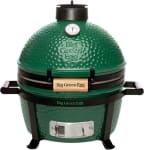
First of all, we loved the way our food tasted after being cooked on the Big Green Egg MiniMax. It’s everything we love about the larger Big Green Eggs, just in miniature form! These kamado-style grills use charcoal but have thick, ceramic sides that store a ton of heat, radiating that energy very efficiently as you cook. It had the best temperature control of any charcoal grill we tested. That being said, this is not a portable grill; I had to ask for help to move the 76-pound grill! It’s also much smaller than the other grills, fitting about four burgers, and it’s significantly more expensive, too. Since the ceramic construction takes a long time to cool down, we wouldn’t recommend this model for tailgating, but it would be a great fit on a small backyard patio where it wouldn’t have to be moved often.
Unlike the other grills on this list, the Big Green Egg isn’t available at national chain stores. It’s available at most Ace Hardware stores, but they’re usually sold through individual dealers. The prices tend to vary by dealer as the Egg is often sold as part of a package deal or a special. Find a dealer near you to get the price of the MiniMax (it was available at my local store for $598).
Pros
-
Excellent temperature control
Cons
-
Too heavy (76 lbs.) to be portable
-
Maxes out at 4 burgers at a time
-
More expensive than others of a similar size
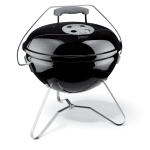
Although the Weber Smokey Joe did a fantastic job of grilling our food, it lacked a few features that would have bumped it up in our rankings. You can get a premium version that has a lid lock, but the basic version provides no way of carrying the grill. That means when it’s full of hot coals, it stays where it lies until it cools down. We were pretty happy with the way the vents were positioned, but the ash catcher isn’t removable, making it pretty difficult to clean when you’re done cooking. It’s small and simple—fitting about six burgers—but we’d rather upgrade to the Jumbo Joe to get the extra ease-of-use features.
Pros
-
Vents positioned well
Cons
-
No locking or carrying features
-
Difficult to clean
-
Maxes out at six burgers at a time
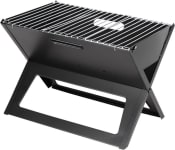
There were a lot of things to like about the Fire Sense HotSpot Notebook. If this contest were all about portability, this one would win! It folds down completely flat and includes storage space inside for the three-hinged grill grate. Not only that, but it’s available for a fraction of the price as the other portable grills. It’s super easy to set up, and although the stainless steel grate was slightly uneven, it worked well enough for our liking. The frame was surprisingly sturdy and did a great job at high-heat cooking, but because there are no vents or lid, it didn’t do well on the chicken tests. There was no way to control the heat, so the chicken either burned over direct heat without cooking through inside or it was still undercooked after an hour over indirect heat. You also can’t move the grill until it completely cools down, and the ashes blow around everywhere because it lacks an ash catcher bucket. It’s a great grill if you’re looking for a cheap way to cook hotdogs at the beach, but we wouldn’t recommend it for heavy-duty use.
Pros
-
Superior portability and sturdy design
-
Easy to set up
-
Cooks well at high heat
Cons
-
No way to control heat
-
With no catcher, ashes fly around
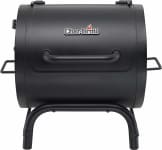
The Char-Broil American Gourmet is a barrel-style grill with a hinged lid. While we liked the idea of its pull-out drawer to add coals, the door stuck badly and was frustrating to use. And because the drawer’s grates ran vertically, it was difficult to rake the coals from side to side to create an indirect heat pattern. The grill itself was easy to clean and sturdy as we used it, but it was difficult to see inside the grill and the rounded lid design funneled the smoke straight into your face. Add in the fact that the carrying handles got extremely hot as you used it and it was a touch on the heavy side at 30 pounds, and this one fell to the bottom of our list.
Pros
-
Sturdy
-
Easy to clean
Cons
-
Coal drawer sticks
-
Difficult to rake coals
-
Difficult to see inside the grill
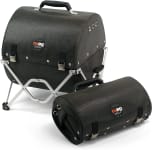
When we first set up the GoBQ Portable Charcoal Grill, we were certain it wasn’t going to work. Made from flexible flame-resistant silicone coated fiberglass, this minimalist grill rolls up into an easy-to-carry package. When unrolled, it looks like a pouch on stilts. Fill the pouch with charcoal, light it using a fire starter cube, place the grill grate on top of it and you’re ready to cook.
The GoBQ did an admirable job of cooking our burgers and chicken drumsticks. The charcoal in it lit quickly and imparted a smoky flavor into the food. Unfortunately, because it’s so small, it can’t cook more than four burgers at a time. Its size also made it impossible to arrange the coals into an indirect heat pattern. Additionally, as the GoBQ doesn’t have any vents, you can only use it at one temperature.
When the time came to clean up, we found the ashes were hard to remove from the GoBQ. There’s no ash basket, so you have to wait for the grill to cool down, remove the grill grate, and turn the whole grill over to remove any ashes.
Given these shortcomings, we can only recommend this grill for occasional use: it’s a good fit for impromptu grilling sessions at the beach or as a compact grill to use while camping. However, we can’t recommend it to anyone looking for a grill to cook with on a regular basis.
Pros
-
Easy to store and transport
Cons
-
Small grilling area
-
No vents
-
Ashes are hard to remove
Other Portable Pellet Grills We Tested
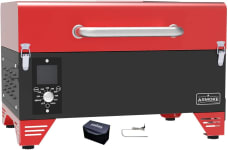
If our top-rated portable pellet grill is out of stock, we recommend picking up the ASMOKE AS300 Portable Grill. Like the other portable pellet grills we tested, at 45 pounds, it’s a little on the heavy side. While it doesn’t come equipped with any handles to help move it from place to place, the AS3000 folds down into a compact enough package to carry from one space to another, when it’s cool.
We loved that the 256 square inches of cooking area could hold up to eight burgers, which also means there’s plenty of room if you want to cook a whole pork shoulder or a spatchcocked chicken. Although we didn’t test the grill at low-and-slow smoking temperatures, it’s capable of ranging from 180°F to 500°F. We were happy to see that it held its set temperature within 10°F when used at medium and high temperatures.
Most pellet grills use a deflector plate to produce indirect heat, allowing your food to cook evenly. AS3000 has a deflector plate, however, the plate has a sliding door built into it to allow direct access to grill’s flames if you want to sear items like burgers and steaks. Unfortunately, when closed, the sliding door allows more heat to pass through it than the rest of the deflector plate does. This had us moving chicken drumsticks around the AS3000’s cooking surface to ensure that they all cooked evenly.
Pros
-
Large cooking surface area
-
Maintains consistent temperatures
Cons
-
No handles
-
Heavy
-
Sear door isn’t well designed
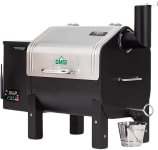
The Green Mountain Grills Davy Crockett Pellet Grill Tailgating Package cooked delicious burgers and chicken drumsticks, but its design wasn’t well thought out.
Heavy and not very portable, the Davy Crockett’s lack of wheels and handles made it difficult to move around. But our biggest complaint was that the grill was extremely noisy during use. The auger made a high-pitched screeching noise when in use, and it kicked on every two to three minutes when used at high-heat searing temperatures.
We did appreciate, however, that the Davy Crockett can utilize multiple power sources: it can draw power from a wall socket or get juiced up via its included 12-volt adapter. You can even hook it up directly to a car battery. While it’s nice to have these options, they’re not enough to outweigh this pellet grill’s negatives.
Pros
-
Can be used on 12-volt or plugged directly into a car battery
-
Maintains consistent temperatures
Cons
-
Noisy
-
Doesn’t have handles or wheels
